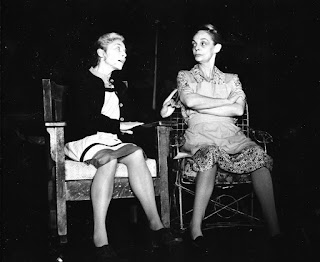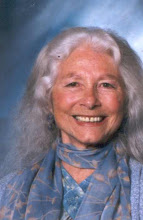I searched ads, made calls, and went on interviews. No luck. My year's unemployment and temp jobs prejudiced my hiring ability. I complained to a friend who said I should go back on Unemployment.
"I just got off and I hadn't worked at my last job long enough," I explained.
"It doesn't matter-"
"Besides, I wasn't laid off; I left on disability."
"You should still try," she insisted.
Before I trekked down to the office, I scanned the want ads again. Marsh & McLennan was still looking for a file clerk. I made an appointment with Ms. B, in the Human Resources department. I donned my business attire -a pin-striped suit, with a fitted jacket and black flats- and rode my bike to # 3 Embarcadero Center where it was located on three of 41 of its floors. I had revised my resume to include information regarding self- promotion of my mime and lecture demos, and performances during the year of having no permanent professional position. I wasn't just lollygagging around.
(Embarcadero Center 3 was in the Embarcadero Center Complex. It was one of five hi-rise office buildings with retail shops and restaurants on lower open air levels, situated between Battery St. and Justin Herman Plaza at the foot of Market Street; Sacramento and Clay Sts.)
 |
| Embarcadero 3 |
I interviewed with Ms. B. a severe-looking woman with short-hair, rimless glasses, business suit and "sensible" shoes. She took her time perusing my resumé, then said,
"You're overqualified for this position, you know.""At this point, I'll take anything just to get my foot in the door. Then maybe apply for something more suitable down the line whenever there's an opening-if that's all right."
"Well, I see you once worked as an underwriter for Fireman's Fund. Do you know that Wes Schultz from the Fund works here, now?"
"Yes, but I didn't want to- I felt like I was being desperate so didn't want to call him."
"That would have been fine. It's networking, a common practice in the business world. It's expected," she explained. "Turns out," she went on, "he needs someone in his department, an in-house Fireman's Fund Insurance Company. You'd be perfect. I'll call him, tell him you're here." While waiting for Wes, she gave my resumé another read. "You know, the fact that you did your own marketing for your art is just what we want here at M & M. We like creative, entrepreneurial people- " Before she could elaborate, Wes knocked on Ms. B's door and peeked in.
"Come on in, Wes. Gaetana's here. She's looking for a job. Can you use her?" Wes was enthusiastic and surprised to see me. We hadn't contacted each other during the year, each of us busy living our own lives: Wes-working full time and dealing with the sickness and death of his friends and lovers from AIDS- me, promoting my shows, performing at benefits, fairs and schools.
"Oh, my God! This is just great!" Wes said, "You should've called me!"
"That's what I told her," Ms. B. interjected. "She's didn't want to seem desperate. . ." She chuckled and shook her head.
"She'll have to talk to Wendell, though-" Wes turned to me, "My boss. He's pretty easygoing. You'll be fine. His wife owns a bar in North Beach," he added.
It was too late to set up an interview with Wendell so I was to return in the morning. Ms. B. and Wes assured me I had the job. I was to report to Ms. B. She'd escort me to his office and introduce me. But when I interviewed with Wendell, I wasn't so sure.
The next morning, I again threw together something "business-like" and rode down to #EC3, locked my bike in the convenient bike racks inside at street level, took the elevator to the 11th floor and reported to Maria, the receptionist behind a huge polished oak desk at the end of the hall whose carpeting was a wild bright green, blue, and yellow striped with intermittent narrow red stripes. Green being the dominant color. Maria called Ms. B who then showed me to Wendell's office. He wasn't there. His secretary told me to sit down and wait.
Wendell Wong was a slender man, in his late 30s, early 40s, with a shock of thick coal-black hair. He wore a dark suit, white shirt, and tie. He sat down, introduced himself and barely glanced at me as he paged through a folder containing my file which Ms. B had left on his desk. The interview with Mr. Wong was going well, I thought. He asked me how long I'd known Wes Schultz, when had I worked with him. He asked about my years at Fireman's Fund, why I had left (I didn't leave, I explained, they had moved their offices to Lucas Valley. I didn't want to relocate, still I wasn't going to quit, but considered commuting a hardship, so they let me go.) He then looked at me and kept looking at me, staring, which made me uncomfortable. Then he said:
"You know, we are a young company."
"How do you mean?" I dared ask.
"Well, we have a young personnel."
"Fine," I said, "I'm okay with that. I get along with people of all ages."
He thanked me, ended the interview with,
"Well, we'll be in touch."
In my naiveté, I forgot that I was in my mid-forties, that my hair was almost completely white by this time.
Wes met me by the elevators.
"How'd it go?"
"Okay, I think."
"What do you mean? Did he tell you you got the job?"
"No," I said, "He told me he'd let me know."
"I'll talk to him. I'll have Ms. B. call you at home."
I'd just gotten home when my phone rang. It was she.
"I'm happy to tell you that Mr. Wong has approved you for the position of Assistant Underwriter to Wes Schultz in his in-house Fireman's Fund Insurance Company. Can you start on Monday?"
"Yes, thank you, of course."
"Come to my office at 8, then, on Monday."
It was 1984 another auspicious year: Reagan deals with the Soviet Union; orders to "redeploy" US Marines to US Navy ships offshore in Lebanon, saying that the bombing of the Marine barracks that killed over 200 Marines,"Syrian sponsored."and US warships attack pro-Syrian militia positions for nine hours in Lebanon;
 |
| Reagan and Gorbachev |
Iran accuses Iraq of using chemical weapons;
China plans to spend one billion on technology from the US in order to reduce "bureaucratic delays and to encourage foreign companies to do do business with and to invest in China; benefitting from an improved economy;
Reagan begins re-election bid in October, against Mondale; debates him later that month focussing on the Soviets Union's Gromyko. That same month, Patrick Magee of Ireland's PIRA bombs Brighton Hotel where Britain's Conservative Party is holding a conference, killing five and injuring more. The bomb destroys PM Thatcher's bathroom two minutes after she had left. She soldiers on with her conference speech a few hour later.
Poland's secret police arrest Catholic priest, and supporter of the Solidarity movement, Jerzy Popieluszko. Weeks later, his body is found in a reservoir. The perpetrators are convicted of the crime, yet Poland's Communist Party still near collapse.
Sandwiched between Indian Prime Minister Indira Gandhi's shocking assassination by two Sikh security guards and Bhopal, India's Union Carbide pesticide plant leaking methyl isocyanate killing more than 2,000 and injuring anywhere from 150,00 to 600,00 others (some 6,000 would die later ), Reagan wins all but Mondale's home state and 59 percent of the popular vote;
Mikhail Gorbachev, whom Thatcher tells Reagan, "is less constrained, more charming and more open to discussions and debate" is Russia's No. 2 man.
 |
| Book Cover illustration |
Finally: It is decided that 1984 did not stand up to Orwell's novel Nineteen Eighty-Four, as a satire on Stalinism. Stalin was long gone and denounced by Nikita Khrushchev. Since 1979, its politburo had Maxrist-Leninist Mikhail Gorbachev as a member. He would become General Secretary of the Communist Party in March, and, some said, would try to make the Soviet Union more liberal.
On Monday I would begin my years at Marsh and McLennan, Inc. International Insurance Company. I vowed to stay there until I retired. At my age, it would be difficult to get a job if I left M & M.
It took me a few months on the job before I realized what Mr. Wong was trying to tell me- I was too old for his unit. I felt if it hadn't been for Wes and Ms. B, he wouldn't have hired me.
Next Up: Orienting myself to a new routine, meeting people, (Mutt & Jeff, and others); and learning to use the Fund's dedicated computer software to process insurance policies, under Wes's- my boss- tutelage. Sticky situation: how administration deals with a former employee and Wes's friend, who suffers from AIDS dementia, yet keeps showing up at the office. Still a loner, I leave the office on breaks, rather than hang out with Wes and friends at expensive lunches; no doubt, hampering my chances for advancement.
.











